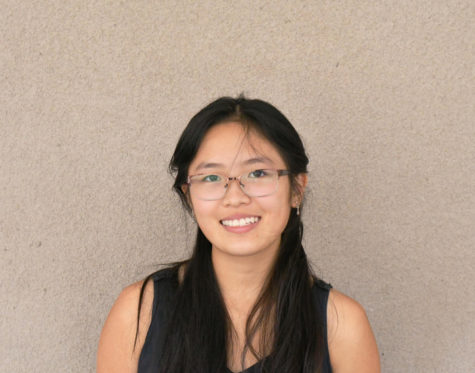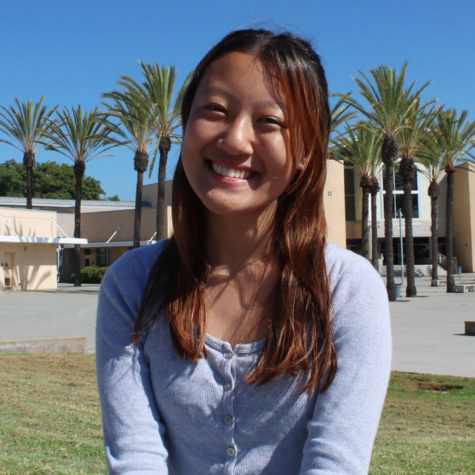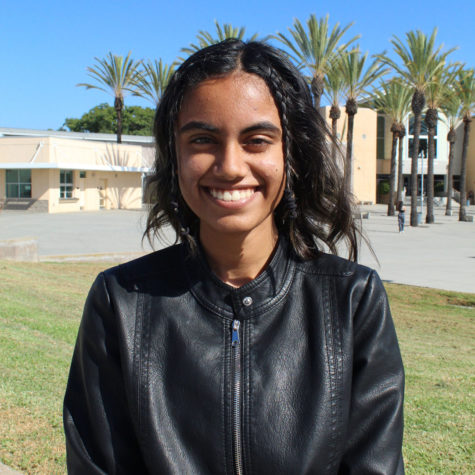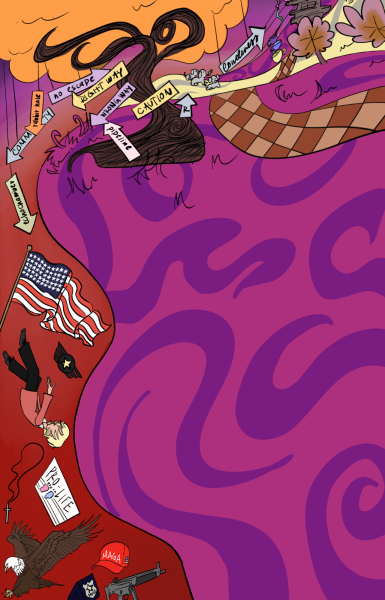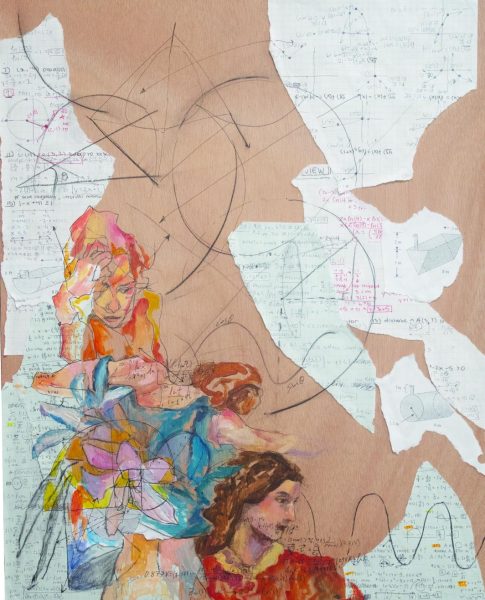Stopping to smell the roses
Seniors overcome challenges, learn to live in the moment
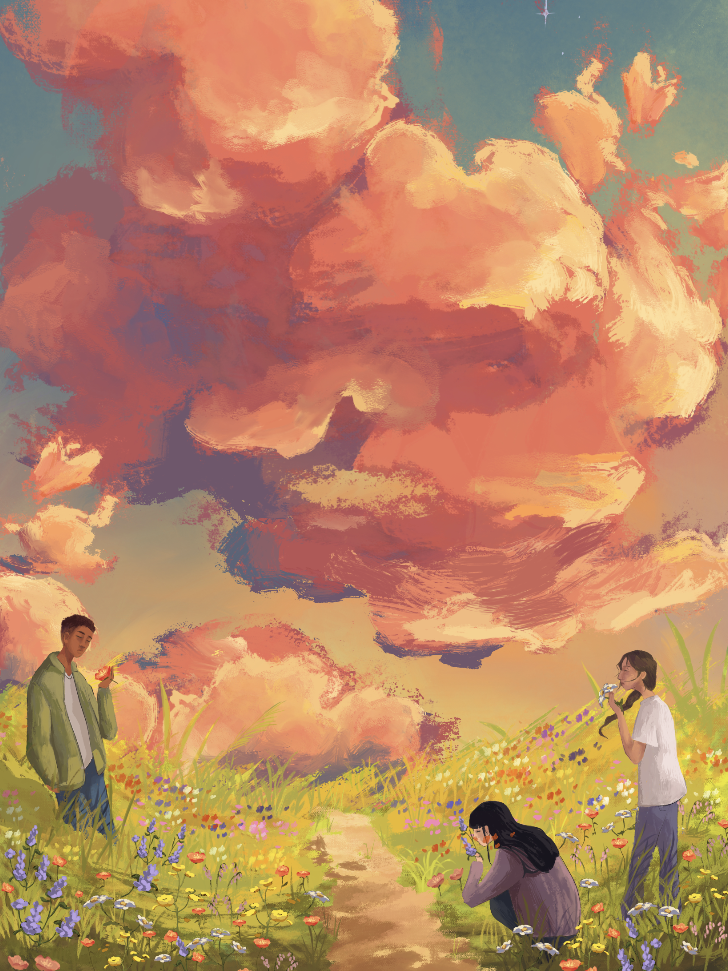
Chen savors life after college apps
In late January, Mia Chen (12) found herself on a road trip in the Joshua Tree desert with a few of her closest friends, sitting in the hot tub of an AirBnB they’d rented, gazing into the dark at a night sky unpolluted by city lights. To her, it was almost surprising in that moment, how far removed it felt from where she was the same time last year
“I don’t think I ever could’ve done something like that back when I still hadn’t gotten into college,” she said. “My parents and the schoolwork I needed to do wouldn’t have allowed for that.”
In junior year, Chen’s reality was one of hard work, of looking forward instead of upward.
Curfew was 9:30 p.m. every night, and pressure from all directions—her parents expectations, her brother’s previous academic achievement, and in some ways her own—meant that she was always on the lookout for the next challenge, the next test, the next way to improve herself.
“I honestly think the stress was more from around me than anything else,” Chen said. “I would’ve been fine with going to an in-state school, but everything in my life was building up to [getting into college] in a way.”
But after Chen got into her dream school, MIT, through the school’s early action application process, everything changed, almost overnight.
“It was pretty drastic,” Chen said. “Beforehand, I wasn’t able to go out much—it wasn’t completely my mom but it was also me knowing I had to get stuff done so I wouldn’t try to hang out with my friends very often, but afterwards, my mom got a lot more relaxed and so did I.”
A year later, however, it was like she’d finally taken the chance to breathe.
“My curfew moved back two hours, for starters,” Chen said. “And suddenly the most my mom was doing when she saw me video-calling my friends was frowning when before she was definitely not fine with me on call with people into all hours of the night.”
Chen finally had the opportunity to become closer to the people she’d considered part of her friend group, in a way that had never been possible before. She could stay up late on Facetime nearly every night with them, laughing and talking until almost everyone else in her family had gone to bed; She could attend school dances, go to Europe over Spring Break, and make memories she’d cherish forever.
“I definitely felt myself growing closer with the people around me because now I could finally hang out with them,” Chen said. “My perspective on our friend group has definitely changed since I’ve been able to start actually hanging out with them in the sense that they’re more of a friend group than an acquaintanceship.”
For some students, a college acceptance is more than just a key to the future—the golden word of “acceptance” is also a key to here, and now, an ability to enjoy themselves that had previously felt out of reach. In Chen’s case, while her parents had always been supportive of her academic goals, she said that the news of her admission to MIT was a turning point in their relationship.
“I think my mom was finally okay with me doing things she’d previously thought of as distractions,” Chen said.
Since her acceptance, Chen has been working hard, not to maintain her GPA or to keep up with extracurriculars, and generally just living her life to the fullest degree. Knitting, in particular, has been something that Chen has finally gotten to explore, without the pressure of college applications looming large.
“I’ve definitely had a lot more time after college to get into hobbies that I wouldn’t have before everything happened,” Chen said. “Knitting and crocheting, for sure, are both really time-consuming but also really relaxing and I’m glad I finally have the time to sit down and do them.”
She’s gone kayaking, and gone on walks past sunset, and stayed out past 11:00 p.m. and watched movies on weekdays, all things that were unimaginable before. Most of all, she’s enjoying things that will no longer be in such close reach once she’s in college.
“There’s going to be a lot of time for me to worry about the future in the next four years,” Chen said. “For now, I really want to spend time with my friends, especially the ones that aren’t going to be in Cambridge with me, because I know we’ll have so much less opportunity to hang out.”
Palacios grounds self in friendships
Sometimes, when it’s raining and the scent of wet asphalt fills the night air, Sam Palacios (12) walks onto their silent street and feels the cool rain pattering on their arm and the soft tapping of the rain hitting the ground.
“It’s like [I’m] feeling alive,” Palacios said. “There are so many people on this planet, yet I get to stand here, in this moment, by myself.”
For Palacios, particularly during the college-application season, it was easy to get swept up in worries about the future; neither of their parents attended a four-year college, so they navigated the process themself. It was with the consistent guidance of the Westview counselors, with whom they skipped hangouts with friends to meet, that they were able to apply to colleges. In January, they committed to Boise State. But shortly after committing, as they tousled in their bed one night at 1 a.m., they reached an epiphany: they wouldn’t be in the same bed they were in a year from that moment.
“It just kind of made me realize [that] I’m missing everything that’s going on because I’m so worried about what it’s going to be like in a year when I’m still right here,” Palacios said.
Even before their senior year, since Kindergarten, Palacios’ struggle with their gender identity made it difficult to be present. Although they knew that they were gay, they didn’t have the vocabulary to label themself as being non-binary until high school. Until then, they believed they were transgender.
“When you constantly pretend to be someone else, it’s like you’re living someone else’s life,” they said. “You’re not living yours because you’re always trying to keep up appearances, act a certain way, be a certain way, be around the people who you think you need to be around. It’s like you’re not really living in the moment. You’re just living a narrative that you made for yourself.”
Growing up, Palacios’ Nana would dress them in leggings and blouses and style their long hair, at the time, half-up and half-down.
“My Nana—I love her—but she used to buy all my clothes,” Palacios said. “She used to do my hair and I swear I looked like a 40-year-old woman when I was 8.”
In seventh grade, Palacios cut their hair short under the guise of donating it, but did so, truly, so that their appearance would reflect their gender identity. Since then, they’ve worn the clothes they wanted to wear and maintained a comfortable, short hairstyle.
In May, their friends Bridget Yang (12) and Taisia Latimer (12) took them to buy their first suit for Prom. For three hours, Palacios had their arms measured, tried on different suits in various colors, and learned the distinction between a modern-fit suit and other styles, while Yang and Latimer teased them, making an overwhelming situation bearable.
Even in the chaos of ROTC’s first field meet in three years, Palacios’ friends grounded them in that moment. As Lily Bashar (12) distracted Palacios, Jacelyn Macareg (12) surprised Palacios with a pie—because Palacios detests cake—and the field meet team sang “Happy Birthday” to them.
Spending time with friends is one type of self-care, which can take a variety of forms depending on the individual, according to licensed clinical psychologist Lauren Franks.
“Self-care is the concept of ensuring that you feel equipped both personally and professionally to live life and move toward goals in a sustainable way,” she said. “The healthiest way to cope is to be honest with yourself about what brings you joy and restoration and focus your energy in those areas.”
For Palacios, it’s hard to fathom that graduation is a week away. When they move 743 miles away from California, they aren’t worried about their friendships, but they want to cherish the time they have left in San Diego.
“I try to live in the moment [and] take everything in, because I’m not going to get all this time back,” Palacios said “I always try to make the most of it, just make sure that I’m not trying to think too far ahead.”
While working with Macareg at Jersey Mike’s, as much as Palacios might not want to be present, and despite desperately wanting a lunch rush to end, they trade a shared smile. When their good friend Lily Bashar (12) moved into a new house, as Palacios laid on her bed, Bashar sat on the floor, trying to figure out where to put her shirts and pants. These are the moments that may seem mundane, but ones in which Palacios hopes to savor until this chapter comes to an end.
“Using mindfulness is an excellent way to enjoy the moment,” Franks said. “Mindfulness as a practice can be described as awareness without judgment. If you are feeling bittersweet emotions as the school year closes, notice those feelings, but don’t assign them a judgment of being good or bad feelings and don’t try to change them. Let yourself feel whatever feeling arises.”
Caires, Hamid find joy in being present, appreciate routine while healing
Gymnastics meant the world to Camille Caires (12). She enjoyed how rewarding beams were once she competed, how focused vault was on one skill, how freeing tumbling during her floor routine was, and how challenging yet exciting bars were. Caires could show who she was through gymnastics, a sport that had been a part of her life since she was 2 years old.
But CIFs, or league finals, or nationals wasn’t the end of Caires’ final high-school gymnastics season. The sound of a slam during a jump for one of her favorite moves, a round-off full twist, and the resulting ruptured Achilles heel on April 5 was.
“Last season was our first CIF win and our second league win and I was the CIF all-around champion,” Caires said. “It was horrible to go from the top to nothing. I lost so much all at one time.”
A week after Caires’ injury, she underwent surgery, and during the subsequent two weeks, she was unable to leave her home.
“It was like the quarantine during COVID, but worse because everyone else could leave [their house],” Caires said. “One of the things that I do the most now that I’m back in normal society is my routine, because it’s motivating and adds purpose.”
Caires said she has a typical routine. She wakes up, gets dressed, does her hair, feeds her cat Mia, eats breakfast, makes lunch, goes to school, and sees her friends. Although nothing about it is extraordinary, this routine is what has grounded her, allowing her to find joy in otherwise bleak circumstances.
“When I woke up [before my injury], it felt like going to school was just something I had to do,” Caires said. “But now, I enjoy it a lot more because the alternative, in my opinion, is a lot worse. So now I’m just excited for what I get to do during the day, and I’m happy to have a routine again.”
As captain of the gymnastics team, Caires still had an obligation to attend all the teams’ remaining meets despite knowing that she would never be able to return to the sport competitively. Being on the sidelines was extremely difficult for Caires, who has always preferred doing to watching.
Caires was one of two gymnasts in the Rancho YMCA gym who had reached Level 9. Looking back on it now, though, Caires said she wished she could have enjoyed gymnastics more.
“The environment was stressful and demanding, and I was expected to be perfect and be the example for younger students,” Caires said. “I never wanted that. I just wanted to have fun. And now that I’ve been going back once a week, I can’t really do anything [as a gymnast]. But I can do something. And I think I enjoy it a lot more now even though I’m doing eight levels below what I used to.”
She won’t be able to fully regain the ability to walk until approximately July 20, but Caires has been able to find happiness in the small moments, like her first step.
“The most enjoyable thing I have done is take a step,” Caires said. “I haven’t been able to walk for five weeks, and even though [I walk now] in a boot, I’m actually getting better and I know it’s going to be normal again. Even though the gymnastics [season] has ended [for me], new things can fill that place and I can still be happy.”
Caires has filled the three hours daily that she would have been practicing gymnastics by crocheting, exercising, and taking classes at Palomar.
“I went to the gym a few days ago and was able to ride the bike, which was one of the most exciting things in two months,” Caires said. “And it was really interesting because I never thought I’d be so excited to sit on a non-moving bike.”
Beyond slowly regaining what she has lost, Caires’ newfound appreciation for everyday simplicities applies to life itself.
“We live in such a fast-paced life that sometimes it’s worth it to slow down and enjoy what you have in the moment,” Caires said. “You don’t think about how far the walk is until you can’t walk, and you don’t think about how skinny the grocery aisles are until you’re in a wheelchair and you can’t get through. But even though things change, I’ve learned I can still be successful in seeking happiness and joy.”
Like Caires did with gymnastics, Nasmah Hamid (12) fell in love with the sound of the violin at a young age: her favorite song, Ayami beek, features a violin soloist. She jumped at the chance to play the instrument in fourth grade, and for the next two years, she built a foundation in music.
In sixth grade, everything changed. She could no longer play the violin or spend time with her friends or attend school. Hamid was diagnosed with Stage 3 lymphoblastic lymphoma, a cancer of the immune cells.
And throughout sixth grade, Hamid was hospitalized, receiving treatment. In seventh, she began to go in and out of the hospital, and by the end of eighth grade, she was declared cancer-free.
But going to high-school after three years of missing school meant that Hamid not only had to transition back socially, but begin learning what she had missed academically.
“Everyone around me was doing a lot, and I just had to catch up, so I wasn’t able to fit the expectations of high-school, of doing a lot of extracurriculars and taking AP classes,” Hamid said. “And I also had the trauma [of cancer] to add to that. I felt lost.”
It was the violin that helped her understand herself. She picked it up again the summer before high school, teaching herself how to play through videos online. Eventually, she learned to channel her emotions into notes, her thoughts into songs.
“I feel like the best way I improved my mental health was actually feeling the emotions,” Hamid said. “Instead of burying [my emotions] deep inside, taking a moment to feel it, and having the violin to play songs that reflected how I was feeling, made me feel my emotions.”
The violin gave Hamid a way to escape the comparisons and expectations she struggled with. Particularly during online school, she realized that she was playing the violin for herself, that her progress was not defined by others’.
“I was in the school orchestra, and there were expectations, but because we had two years of COVID, I had a moment to think about just my progress alone,” Hamid said. “Orchestra during COVID was based on you. We didn’t have Zooms, so I didn’t have to think about how other people played. That allowed me to think about academics and extracurriculars, and I realized that it’s about my own progress and not about other people, and I shouldn’t compare myself to others. The violin taught me that.”
Like Caires did, when the expectations no longer remained, Hamid found joy.
“Once I stopped comparing myself, I started appreciating things more,” Hamid said. “I started appreciating my progress. I appreciated life in general. The violin has left a really big impact on me. It’s become a part of me.”
